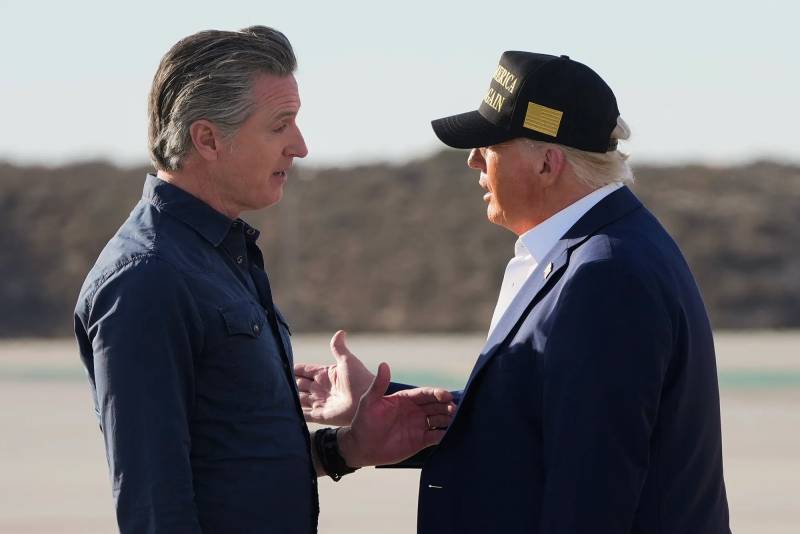“While his continued comments threatening conditions on federal aid and to eliminate FEMA are deeply concerning, we remain hopeful this visit moves the President and Congress closer to focus on relief over partisanship,” they said in a joint statement. “Americans should be able to count on our support to recover and rebuild in the wake of these tragedies, no matter what state they call home.”
As for Newsom, he’s at a precarious moment in his relationship with the president. While he initially positioned California at the forefront of a renewed resistance after Trump won a second term in November, even calling a special session to fund litigation against the incoming administration, Newsom now finds himself dependent on the goodwill of a federal government almost fully under the sway of Trump.
It’s unclear how forthcoming federal assistance will be. Since the outbreak of the Los Angeles fires more than two weeks ago, Trump has continued to inaccurately claim that Los Angeles lacked water to fight these fires because the state does not send enough water south from Northern California. He has depicted them as Newsom’s fault and even demanded that he resign, although fire and climate experts have repeatedly attributed the blazes to off-the-charts dry conditions in the face of ferocious Santa Ana winds.
Nonetheless, with the support of many congressional Republicans, the president has threatened to withhold or condition disaster aid.
Trump’s interest in voter ID goes back to at least 2016, when he began insisting, without any evidence, that he failed to win the deep blue state of California because people who aren’t citizens participated in the presidential election. A new California law that took effect this year prohibits local governments from requiring voters to present identification to cast their ballots in an election.
In a post on social media, Newsom’s press office pointed out that California requires people to present identification when they register to vote and wrote, “Conditioning aid for American citizens is wrong.”
Newsom has substantially, though not entirely, pulled his punches against Trump in recent weeks. He largely kept a low profile leading up to the president’s visit, working on fire response from Los Angeles. After the president erroneously complained in Monday’s inauguration speech that the fires were burning “without even a token of defense,” Newsom issued a gentle statement that emphasized “finding common ground and striving toward shared goals” with the Trump administration.
“In the face of one of the worst natural disasters in America’s history, this moment underscores the critical need for partnership, a shared commitment to facts, and mutual respect,” Newsom said.
Yet he also, on social media, slammed several of Trump’s early executive orders on immigration and climate change, then sent an email to supporters deriding the passage from Trump’s inaugural speech as “nonsense” and “insulting” to firefighters.
Meanwhile, the governor’s special session to “safeguard California values” from the Trump administration continues on, with Democrats in the state Senate voting Thursday to advance $25 million for legal fees. Republican lawmakers have lambasted the session as a distraction from wildfire response and an unnecessary poke at the president.
Allen, the senator from Santa Monica, said he understood that Trump is fulfilling his campaign promises to the Americans who supported him, but that California politicians would be derelict if they didn’t push back, because voters had elected them with a different vision for how to run the country.
“We want, and our constituents want us, to cooperate with the federal government to help on the areas of mutual agreement and need,” he said. “The flip side is, we are also part of the loyal opposition.”
Newsom told reporters Thursday that it was important for the state to prepare to fight Trump at the same time that he is courting the president’s help, noting that Trump “already assaulted the Fourteenth Amendment” with his day one executive order challenging birthright citizenship, which California immediately sued to stop.
The governor evoked the “great relationship” he had with Trump during the COVID pandemic, when they spoke nearly every week, and said he did not expect the special session to affect that because it was “nothing personal,” but rather based on “fundamental policy disagreements.”
“This is situational. Don’t color it in any more than it needs to be,” Newsom said. “I’m here for the long haul, to support the president where we can, to defend our values where we must.”

